Do you want to learn more about the unique taste of white tea?
It can be difficult even for experienced tea drinkers to pinpoint exactly what white tea tastes like.
While its flavor is gentle, subtle and sweet, it also contains profundities of herbaceous floral flavors that make it an intriguing and delectable delicacy.
From its origins in ancient China to the reasons behind its delicate yet exquisite taste, here we will dive deep into all things related to the wonderful world of white tea!
What is White Tea?

White tea is a minimally processed tea made from the young leaves and buds of the Camellia sinensis plant.
It is known for its delicate flavor, subtle sweetness, and smooth mouthfeel.
White tea has a light golden color and a mild taste that is less bitter than black tea and less vegetal than green tea.
It has a subtle aroma and a slight floral, honey-like flavor.
The taste of white tea can vary depending on the type, growing region, and processing method.
The most popular types of white tea are Bai Hao Yinzhen (Silver Needle), Bai Mudan (White Peony), and Shou Mei (Long Life Eyebrow).
White tea has several health benefits, including high antioxidant content, anti-inflammatory properties, and potential cancer-fighting effects.
It is also low in caffeine, making it a great choice for those who want to reduce their caffeine intake.
What Does White Tea Taste Like?
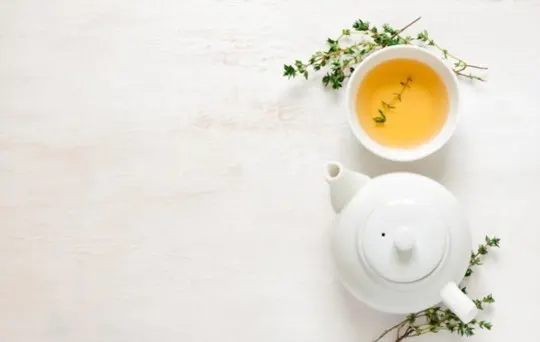
White tea has a delicate and subtle taste, with notes ranging from sweet and floral to vegetal and nutty.
Its flavor profile is influenced by its oxidation levels, growing region, and harvesting methods.
Here are some of the most common taste profiles you can expect from white tea:
- Sweet and floral: This flavor profile is often associated with white teas made from young buds with a high number of white hairs. They are lightly oxidized and have a smooth and sweet taste with floral notes.
- Grassy and vegetal: White teas made from larger leaves and stems tend to have a grassy or vegetal taste with hints of nuttiness. They are often slightly more oxidized than their sweeter counterparts.
- Woody and smoky: Some white teas, especially those grown in the Yunnan province of China, have a woody or smoky taste profile. This is due to the unique soil and climate conditions in that region.
- Fruity: Some white teas are blended with fruits such as peach, pear, or apricot to add a fruity note to the tea.
White tea’s flavors are subtle, and the taste can vary widely depending on factors such as brewing method and water temperature.
Therefore, it’s best to experiment with different types and brewing methods to find a flavor profile that suits your palate.
Factors that Affect the Taste of White Tea
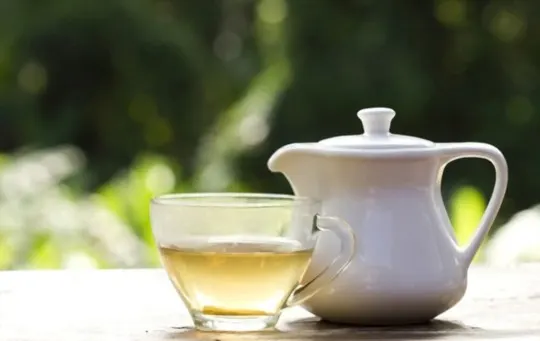
White tea is known for its delicate and subtle flavor profile.
However, several factors come into play when determining the taste of your white tea, including:
- Origin and terroir: White tea is grown in different regions worldwide, and each region has its unique soil quality, elevation, climate, and other factors that affect the taste of tea.
- Processing method: White tea is minimally processed compared to other teas, and this affects the tea’s taste and aroma. The processing method of white tea involves withering or wilting, drying, and sometimes a light bake to finish.
- Leaf quality: The quality of the tea leaves used to make the tea also affects its taste. High-quality white tea leaves have silver or white fuzz on them and a plumpness that indicates freshness.
- Brewing method: How you brew your white tea and the temperature of the water also affects the taste. Steeping white tea in water that’s too hot or too long can result in a bitter or astringent taste.
- Age: Like wine, the age of the white tea can also affect its flavor profile. Some people prefer aged white tea for its mellow, earthy taste.
By keeping these factors in mind, you can better understand the taste, quality, and origin of your white tea.
Pro-tip: To get the best flavor out of white tea, steep the tea in water that’s between 160-180°F for 1-3 minutes.
1 – Cultivar
Cultivar plays a crucial role in determining the flavor profile and aroma of white tea.
White tea is known for its delicate and subtle taste, with earthy, floral, and sweet undertones.
The flavor profile of white tea varies depending on the cultivar and the growing conditions.
Here are some common white tea cultivars and their flavor profiles:
- Bai Hao Yinzhen: This cultivar is also known as silver needle and is made of only the youngest tea buds. It has a delicate and sweet taste with notes of honey and floral undertones.
- Bai Mudan: Also known as white peony, this cultivar is made of the youngest tea buds and the top two leaves of the tea plant. It has a nutty and savory taste with a flowery aroma.
- Shou Mei: This cultivar is made of the older leaves of the tea plant and has a stronger taste than other white tea varieties. It has a bold and earthy taste with fruity and nutty undertones.
2 – Processing
Processing is a crucial step in determining the taste and quality of white tea.
Unlike black and green tea, white tea undergoes minimal processing, which gives it a unique taste and aroma.
Here’s how white tea processing works:
- Plucking: Only the youngest leaves and unopened buds are picked from the tea plant, usually in early spring.
- Withering: The leaves are spread out to dry for a few hours, which helps remove excess moisture.
- Drying: The leaves are baked or steamed at a low temperature to stop oxidation.
As a result of this minimal processing, white tea has a delicate, light, and almost sweet flavor with subtle floral and fruity undertones.
Additionally, the low caffeine content of white tea makes it a popular choice for those looking for a gentler caffeine boost.
3 – Growing Region and Climate
Growing region and climate play a crucial role in determining the taste and quality of white tea.
White tea is mainly produced in China’s Fujian province and other regions with similar climates.
The tea plants are grown in high altitudes with cool temperatures and high humidity, allowing for a slow growth rate and the development of complex flavors.
The taste of white tea is delicate, sweet, and subtle, with a light-bodied flavor that is not overpowering.
The flavor profile is often described as floral, fruity, and slightly nutty, with an aftertaste that lingers for some time.
The taste of white tea can also vary depending on the specific cultivar, growing conditions, and processing techniques used.
Some white teas may have a slightly grassy or earthy taste, while others may have a more pronounced fruity or floral flavor.
If you’re new to white tea, it’s important to note that the taste can be affected by various factors, such as brewing method, water temperature, and steeping time.
To get the best taste and aroma from your white tea, it’s recommended to use fresh, filtered water and steep the tea for 2-3 minutes at a temperature of 170-180°F.
How to Brew White Tea for the Best Flavor?
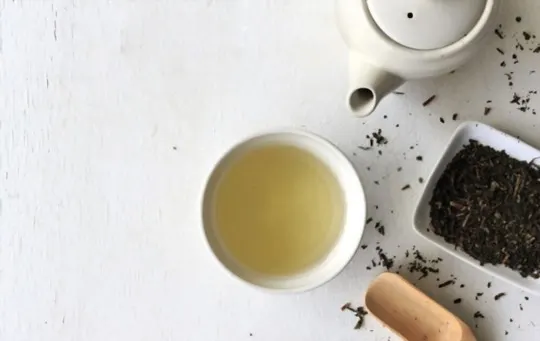
White tea has a delicate, sweet, and floral flavor, and is the least processed tea variety, making it valuable in the tea world.
To fully enjoy its flavor profile when brewing white tea, follow these steps:
- Boil water and let it cool down to 170-180°F.
- Add your desired amount of white tea leaves to a tea infuser and place it in a cup.
- Pour hot water over the tea leaves and let it steep for 2-3 minutes.
- Remove the tea infuser and enjoy your delicious brew.
- To enhance the flavor of your white tea, consider adding a slice of lemon or honey to taste.
Keep in mind that white tea is sensitive to high temperatures and long steeping times, resulting in a bitter and strong flavor.
Therefore, it’s essential to follow the recommended brewing process to achieve the best taste.
Health Benefits of White Tea
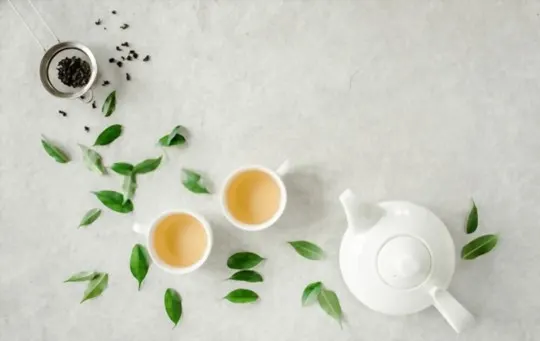
White tea is known for its delicate and subtle taste, with a light sweetness and gentle floral notes that make it a popular choice among tea lovers.
But what many people may not know is that white tea also offers a wide range of impressive health benefits.
Here are some of the benefits that make white tea worth incorporating into your daily routine:
- Boosts Immunity: White tea contains antioxidants, which help to support the immune system and protect against disease.
- Promotes Heart Health: The antioxidants in white tea may also help to lower blood pressure and reduce the risk of heart disease.
- Aids in Weight Loss: Studies have shown that white tea can help to boost metabolism and promote weight loss.
- Protects Skin: The antioxidants in white tea can help to reduce the signs of aging and protect against damage from the sun’s UV rays.
- Lowers Risk of Diabetes: White tea may help to regulate blood sugar levels and reduce the risk of type 2 diabetes.
Drinking white tea regularly can offer a wide range of health benefits, from boosting immunity to promoting heart health and aiding in weight loss.
So if you’re looking for a tasty and healthy beverage, white tea is definitely worth trying out.
Pro Tip: For the best taste and maximum health benefits, choose high-quality organic white tea and steep it in water that is just below boiling point.
Where to Buy White Tea and How to Store It?
White tea, known for its delicate flavor, is grown in limited quantities and can be challenging to find.
Fortunately, several places offer high-quality white tea, including specialty tea shops, online stores, and some grocery stores.
You can also visit tea farms if you live in areas that cultivate tea.
If you choose to purchase white tea, consider looking for handpicked and loose-leaf white tea varieties for the best flavor.
Once you’ve purchased your white tea, storing it correctly is crucial to ensuring that it retains its flavor and freshness.
Store your white tea in an airtight container in a cool, dark, and dry place, away from heat, moisture, light, and strong odors.
Avoid placing white tea in the refrigerator or freezer as it can damage its delicate flavor profile.
White tea has a unique flavor profile that’s delicate, light, and sweet.
It’s characterized by a floral and fruity taste, with subtle hints of honey, melon, and apricot, making it enjoyable for people who prefer mild flavors.
White tea is also low in caffeine, making it an excellent choice for people who are sensitive to caffeine but still want to enjoy tea.
Conclusion
In conclusion, white tea has a delicate and subtle flavor profile that is best enjoyed when prepared correctly.
With its soft and floral notes, white tea is perfect for those who are new to tea drinking or those who prefer a mild flavor experience.
When brewed at a low temperature for a short period, white tea offers a refreshing and soothing taste with a slight sweetness, and a hint of grassiness that lingers on the palate.
Some of the popular white tea varieties include Silver Needle, White Peony, and Shou Mei, each with a distinct flavor profile and aroma.
When shopping for white tea, it’s crucial to choose high-quality loose-leaf tea, and brew it properly to enjoy all it has to offer.
Whether you prefer it hot or cold, white tea is a healthy and delicious beverage that can be enjoyed in many different ways.
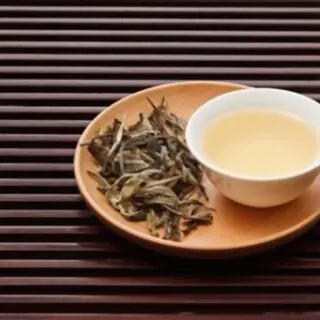
What Does White Tea Taste Like? A Comprehensive Guide
Ingredients
- White tea
- Ingredients from your selected recipes
Instructions
- Select your favorite ingredient from the range available in this article.
- Collect all the necessary items to make the recipe.
- Use the instructions provided to prepare a delicious dish in 30 minutes or less.

Carrie is a food writer and editor with more than 15 years of experience. She has worked for some of the biggest names in the food industry, including Bon Appétit, Food & Wine, and Martha Stewart Living.
As the Editor in Chief of IntroChicago.com, Carrie oversees all of the content on the site. She also manages the team of contributing writers and editors, who help to create delicious recipes, helpful tips, and informative articles that you’ll find on the site.
A native of the Chicago area, Carrie is passionate about all things food. She loves trying new restaurants and experimenting with new recipes in her kitchen. She’s also a graduate of the Culinary Institute of America, so she knows a thing or two about food!
